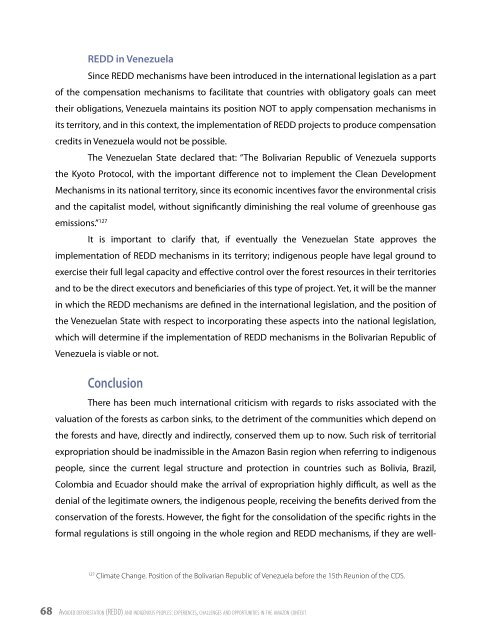Avoided Deforestation (REDD) and Indigenous ... - Amazon Fund
Avoided Deforestation (REDD) and Indigenous ... - Amazon Fund
Avoided Deforestation (REDD) and Indigenous ... - Amazon Fund
Create successful ePaper yourself
Turn your PDF publications into a flip-book with our unique Google optimized e-Paper software.
<strong>REDD</strong> in Venezuela<br />
Since <strong>REDD</strong> mechanisms have been introduced in the international legislation as a part<br />
of the compensation mechanisms to facilitate that countries with obligatory goals can meet<br />
their obligations, Venezuela maintains its position NOT to apply compensation mechanisms in<br />
its territory, <strong>and</strong> in this context, the implementation of <strong>REDD</strong> projects to produce compensation<br />
credits in Venezuela would not be possible.<br />
The Venezuelan State declared that: “The Bolivarian Republic of Venezuela supports<br />
the Kyoto Protocol, with the important difference not to implement the Clean Development<br />
Mechanisms in its national territory, since its economic incentives favor the environmental crisis<br />
<strong>and</strong> the capitalist model, without significantly diminishing the real volume of greenhouse gas<br />
emissions.” 127<br />
It is important to clarify that, if eventually the Venezuelan State approves the<br />
implementation of <strong>REDD</strong> mechanisms in its territory; indigenous people have legal ground to<br />
exercise their full legal capacity <strong>and</strong> effective control over the forest resources in their territories<br />
<strong>and</strong> to be the direct executors <strong>and</strong> beneficiaries of this type of project. Yet, it will be the manner<br />
in which the <strong>REDD</strong> mechanisms are defined in the international legislation, <strong>and</strong> the position of<br />
the Venezuelan State with respect to incorporating these aspects into the national legislation,<br />
which will determine if the implementation of <strong>REDD</strong> mechanisms in the Bolivarian Republic of<br />
Venezuela is viable or not.<br />
Conclusion<br />
There has been much international criticism with regards to risks associated with the<br />
valuation of the forests as carbon sinks, to the detriment of the communities which depend on<br />
the forests <strong>and</strong> have, directly <strong>and</strong> indirectly, conserved them up to now. Such risk of territorial<br />
expropriation should be inadmissible in the <strong>Amazon</strong> Basin region when referring to indigenous<br />
people, since the current legal structure <strong>and</strong> protection in countries such as Bolivia, Brazil,<br />
Colombia <strong>and</strong> Ecuador should make the arrival of expropriation highly difficult, as well as the<br />
denial of the legitimate owners, the indigenous people, receiving the benefits derived from the<br />
conservation of the forests. However, the fight for the consolidation of the specific rights in the<br />
formal regulations is still ongoing in the whole region <strong>and</strong> <strong>REDD</strong> mechanisms, if they are well-<br />
127 Climate Change. Position of the Bolivarian Republic of Venezuela before the 15th Reunion of the CDS.<br />
68 Av o i d e d d e f o re s t A t i o n (redd) A n d i n d i g e n o u s p e o p l e s: experiences, chAllenges A n d o p p o r t u n i t i e s in t h e A m A zo n c o n t e x t
















